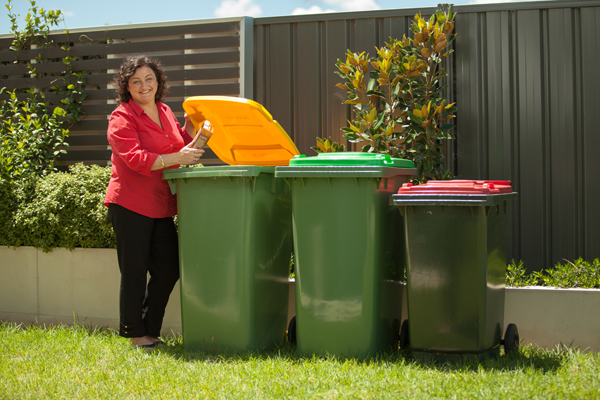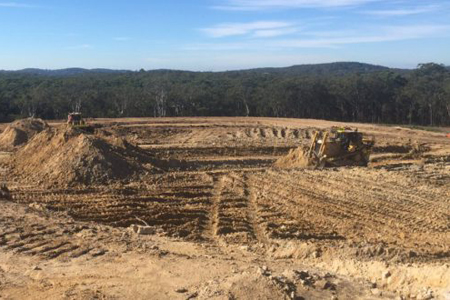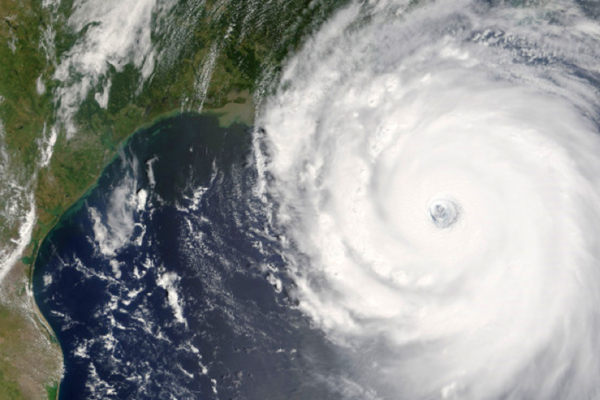The Waste, Recycling and Carbon space is constantly evolving. In order to provide our clients with the best advice, MRA is constantly reading, reviewing and analyzing a range of domestic and international information to pick up on key trends and events.
Posts on The Tipping Point are informed by this ongoing process, but every now and then we discover content or information which either sets a new industry benchmark or deserves recognition. Our Resources library below provides a catalogue of this content that we believe deserves to be shared!
We look forward to expanding the library in the coming months, so if you have an idea or would like to contribute, please email info@mraconsulting.com.au.
Analysis of Australia’s municipal recycling infrastructure capacity
Report published on October 2018 by the Australian Government Department of Environment and Energy

In 2016–17, Australia generated 67 million tonnes (Mt) of waste per year, sending 55 per cent (37 Mt) to recycling, three per cent to energy recovery (2 Mt) and 40 per cent (27 Mt) to disposal. Municipal waste (from households and council operations) makes up about 21 per cent of Australia’s annual waste generation and 17 per cent of national recycling.
In 2017, China announced restrictions on imports of recycled materials. The restrictions, which took effect on 31 December 2017 and 1 March 2018, forbid the importation of 24 waste types and placed strict contamination limits on others—0.5 per cent for materials such as paper, cardboard and plastics and one per cent for metals.
Australia is one of more than 100 countries impacted by China’s waste import restrictions. Australia’s municipal-waste streams have been particularly affected. At the time China’s restrictions were announced, Australia exported about 1.3 million tonnes of recycled material to China. This accounted for four per cent of Australia’s recyclable waste, but 35 per cent of our recyclable plastics and 30 per cent of recyclable paper and cardboard. Approximately 25 per cent of Australia’s recycling involves paper and cardboard, plastics, metals and packaging glass. These waste streams make up the vast majority of the kerbside recycling bin. Global changes in waste markets have drawn attention to the capacity of our domestic waste management infrastructure to collect and process recycled materials from the kerbside.
This report summarises targeted assessments of flows of recycled materials from municipal sources through collection and recycling infrastructure. Focus is given to materials particularly relevant to municipal kerbside collections: paper and cardboard, plastics, metals and packaging glass. This report presents preliminary analysis of the capacity of Australia municipal waste and collection infrastructure by Australian LGAs, and it outlines a review of contemporary international flows of Australian waste following announcement of China’s import restrictions.
Key facts:
- Most Australians have access to municipal waste management and recycling, but kerbside municipal waste collection and recycling services are not available to most communities in remote and regional Australia.
- Australia’s recycling infrastructure is generally capable of managing current volumes of waste but most collection and recycling services have limited capacity to process certain types of recyclable waste. For example:
- Only 10 Local Government Areas (LGAs) have municipal kerbside collections that can accept all types of recyclable plastic and plastic bags
- 58 per cent of Australian households have no access to kerbside collection of organic materials.
- Compacting of co-mingled municipal waste by collectors is leading to greater levels of contamination in recycled materials.
- Most of Australia’s materials recovery facilities lack technical capacity to sort co-mingled, highly-contaminated municipal waste into many specific material types that have low levels of contamination.
- Large volumes of recycled materials end up in landfill due to contamination.
- Since China introduced restrictions on waste imports in 2017, Australia’s exports of recycled material to China have fallen but Australia’s exports of recycled materials have increased overall during 2018.
- Some large businesses have been able to respond to new international waste market restrictions, but most collection and recycling operators in Australia remain vulnerable to changing international waste markets.
- Improvements in access to municipal collection and recycling services across Australia will improve waste management – particularly in regional and remote areas – and increase Australia’s recycling rates generally.
- Improvements to the technical capacity of existing municipal collection and recycling services will better enable dealing with contamination in recycled materials, lifting recovery rates and aiding access to markets for all recycled materials.
- Read more
More countries crackdown on recyclables imports
Originally published on December 19 2018 by Waste Management Review

As Malaysia, Thailand and Vietnam all move to crack down on waste imports, Australia and many global markets are now being faced with a need to look to their own domestic processing capabilities.
Following China’s National Sword imports ban, most exporters of recyclables, including Australia, had turned to other other Asian nations. Now that more and more countries are reviewing their stance on the importation of recyclables such as paper and plastic, MRA’s April 2018 report findings become even more relevant. As reported by Waste Management Review:
“MRA’s modelling identified that if the government was to intervene in the paper reprocessing market, it would be more cost-effective to upscale existing mills than to build new facilities… At $300 a tonne, a capital contribution from government of $30 million would achieve the direct diversion of 100,000 tonnes a year, or 200,000 tonnes per year with a 50 per cent co-contribution from the private sector… In terms of plastics to meet the 40,000 tonnes exported to China, Australia would need to build two facilities or invest $8 to $14 million…” Read more
Talking trash – what you need to know about the proposed waste levy in QLD
Originally published on October 6 2018 by Mondaq

In 2016-17, 912,000 tonnes of waste were transported from other States for disposal in Queensland.
In response, the Queensland Government intends to introduce a levy on waste in early 2019. Has the levy been passed by the Queensland Parliament? Not yet. The Waste Reduction and Recycling (Waste Levy) and Other Legislation Amendment Bill was introduced to the Legislative Assembly on 6 September 2018. Read more
ACOR 10-point plan based on MRA research
Originally published on October 9 2018 by ACOR

Commenting on the Federal Department of Environment and Building upon MRA’s ‘China National Sword: The role of Federal Government’ discussion paper‘, the Australian Council of Recycling (ACOR) has developed a 10-point plan for “rebooting” the nation’s “stagnant” recycling industry.
The plan advocates for a self-sufficient Australian recycling sector which would increase employment and reduce pollution. Click here for the full ACOR plan.
2009 National Waste Policy update: Levers to drive economic and job growth
Originally published on September 19 2018 by WMAA

Commenting on the Federal Department of Environment and Energy’s Discussion Paper Updating the 2009 National Waste Policy, the Waste Management Association of Australia (WMAA) pointed out that there is more that can be done to foster a circular economy.
WMAA went on to reference the MRA report that concluded that domestic remanufacturing of even half of the material formerly sent to China would create numerous new jobs in Australia. The full WMAA press release can be found here.
Setting the standard
Originally published on April 4 2018 by Inside Waste

Inside Waste describes Halve Waste’s achievements as the new standard in waste management.
Halve Waste is an initiative of councils in the Albury-Wodonga region that aims to reduce the amount of waste going to landfill by 50% by 2020 and is coordinated by MRA. Read more
Halve Waste success
Originally published on November 22 2017 by AlburyCity
AlburyCity’s new Albury Waste Management Centre video showcases the recycling and composting practices that are making them a leader in the field…
Four Corners’ portrayal of the waste industry
Originally published on September 13 2017 by Waste Management Review

Mike Ritchie, Director of MRA Consulting Group, explains why the issues of stockpiling glass and interstate waste transport are matters requiring government action.
In August, an ABC report by investigative journalism program Four Corners brought attention to a range of long-standing issues in Australia’s waste management industry. Titled Trashed: the dirty truth about your rubbish, the program focused on contentious problems ranging from the stockpiling of glass to the transportation of waste from Sydney to south east Queensland. Continue reading
The three-minute story of 800,000 years of climate change with a sting in the tail
Originally published on June 13 2017 by The Conversation
Australian scientists Ben Henley and Nerilie Abram made a short video that puts our effect on CO₂ emissions and the climate into context…
There are those who say the climate has always changed, and that carbon dioxide levels have always fluctuated. That’s true. But it’s also true that since the industrial revolution, CO₂ levels in the atmosphere have climbed to levels that are unprecedented over 0hundreds of millennia. Continue reading or watch the video here…
Energy recovery projects need more certainty, waste consultant says
Originally published on June 8 2017 by Footprint News

Energy from Waste (EfW) seems poised to become an accepted technology in Australia with NSW, Victoria, SA, the ACT and WA adopting policies that make it clear recovering energy from waste is better than landfilling it. Footprint News reached out to Mike Ritchie to discuss the recent shift in government attitude and the future of EfW in Australia…
State governments now accept that energy from waste facilities have a role to play, but are failing to support the technology, according to a leading waste industry consultant. MRA Consulting director Mike Ritchie told Footprint that NSW, Victoria, South Australia, the ACT and Western Australia now have policies that make it clear recovering energy from waste is better than landfilling it, which marks “a pretty big shift” in attitude. Continue reading (paywall)
Sydney Markets sends rotting fruit and vegetables to generate electricity in war on waste
Originally published on June 6 2017 by ABC News

ABC News reached out to Mike Ritchie for a comment on food waste recycling and the effect of the absence of a waste levy in Queensland…
Sydney Markets declared its own war on waste 12 years ago which has saved it $20 million in landfill costs. The savings come from diverting 6,000 tonnes of inedible produce away from landfill, and by recycling all the packaging. The NSW Environment Protection Agency’s landfill levy has risen from almost nothing a decade ago to $135 per tonne this year, a higher charge than all other states. Landfill levies by state are: Victoria $60/t, South Australia $68/t (rising to $103/t in three years), WA $58/t (rising to $70/t), Tasmania has voluntary levy. Continue reading or listen here…
Experts divided on landfill levy issue
Originally published on May 31 2017 by Waste Management Review

Between 1996 and 2015, waste grew at a compound rate of 7.8 per cent per annum, according to estimations by MRA Consulting Group based on the Federal Government’s National Waste Policy 2010 and more recent data. The government’s report into the nation’s waste generation and resource recovery found that Australians generated 2.2 tonnes of waste per capita on average in 2010-11, with 60 per cent of this recycled or recovered for embodied energy.With landfill being the cheapest option, recycling incentives have been put in place in various states and territories in the form of a landfill levy. The levies require landfill licence holders to pay a fee for each tonne of waste deposited onto land at licenced premises. But numerous issues have emerged out of the policy. Continue reading
Construction begins on new organics processing facility
Originally published on May 26 2017 by Renee Fedder, NBN News

MRA assisted Lake Macquarie City Council in developing its waste strategy and determining that a 3 kerbside bin system results to optimal financial and environmental outcomes. Full implementation, including food organics to the green bin and fortnightly collection of residuals will commence in 2018, once the state-of-the-art organics processing facility is completed. Lake Macquarie will be the first council in the Hunter to have a combined garden and food waste collection. Continue reading
An opportunity to change your profitability
Originally published on April 20 2017 by Jacquline Ong, Inside Waste

Inside Waste has picked up on MRA’s waste based billing research…
Mike Ritchie on Today Tonight
June 2 2016
Mike Ritchie of MRA Consulting Group outlines the plastics recycling reality in Australia as part of Today Tonight’s piece on unnecessary food packaging waste.
Talking Point: Tassie waste system worst in the nation
Originally published on May 31 2016 by Peter Boyer, The Mercury

Like clockwork, each week we line our streets with bins of stuff we don’t want, and each week the stuff is whisked away, out of sight, out of mind. In functioning ecosystems one species’ waste is another’s nourishment, but nature can’t readily absorb what’s in our bins. So it tends to accumulate where it’s dumped, a practice we call landfill. Landfill isn’t the most polluting thing we do to the planet – that honour must go to pumping greenhouse gases into the air – but it is the most visible sign of a chuck-and-forget mindset that’s a huge obstacle to sustainability. Continue reading
When should we worry about climate change?
Originally published on May 18 2016 by Peter Hannam, The Sydney Morning Herald

News that Tasmania’s Cape Grim weather site had recorded its first baseline reading of 400 parts per million of carbon dioxide sparked some debate over the meaning of the milestone. As we noted ahead of the declaration of the first recording of 400ppm in the southern hemisphere, the primary greenhouse gas increase carried not much more global warming significance than, say, 399 or 401 ppm. But as with other markers – such as Australia’s foreign debt passing a $1 trillion – the 400 ppm tally helps focus our attention. Continue reading
20 years of waste in review
Mike Ritchie – Waste 2016 Keynote Address, May 4 2016
It costs HOW much? The cost of litter management to NSW
Roslyn Florie-George – Waste 2016 Presentation, May 5 2016
EfW in Australia – what does it mean for local government
Dr Ron Wainberg – Waste 2016 Presentation, May 5 2016
Global warming milestone about to be passed and there’s no going back
Originally published on May 10 2016 by Peter Hannam, The Sydney Morning Herald

Within the next couple of weeks, a remote part of north-western Tasmania is likely to grab headlines around the world as a major climate change marker is passed. The aptly named Cape Grim monitoring site jointly run by CSIRO and the Bureau of Meteorology will witness the first baseline reading of 400 parts per million (ppm) of carbon dioxide in the atmosphere, researchers predict. “Once it’s over [400 ppm], it won’t go back,” said Paul Fraser, dubbed by CSIRO as the Air Man of Cape Grim, and now a retired CSIRO fellow. “It could be within 10 days.” Continue reading
The scientist who first warned of climate change says it’s much worse than we thought
Originally published on March 23 2016 by Amelia Urry, Grist

The rewards of being right about climate change are bittersweet. James Hansen should know this better than most — he warned of this whole thing before Congress in 1988, when he was director of NASA’s Institute for Space Studies. At the time, the world was experiencing its warmest five-month run since we started recording temperatures 130 years earlier. Hansen said, “It is time to stop waffling so much and say that the evidence is pretty strong that the greenhouse effect is here.” Continue reading
Mike Ritchie – 2UE Radio Interview 20/01/08
Summary of Sydney Advanced Waste Treatment Developments
Mike Ritchie – ABC Radio Interview 13/12/07
Summary of Sydney Advanced Waste Treatment Developments
Mike Ritchie – 2GB Radio Interview 23/09/07
Summary of Sydney Advanced Waste Treatment Developments
Mike Ritchie – 2SM Radio Interview 23/09/07
Summary of Sydney Advanced Waste Treatment Developments



